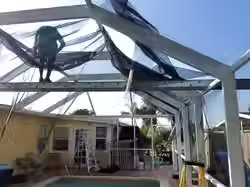How to Boost Your Pool Screen’s Durability With Rescreening
- Carson O'Donnell
- Sep 16, 2025
- 4 min read
When it comes to enjoying your pool area, having a sturdy and well-maintained pool screen is essential. It keeps bugs out, provides shade, and adds a layer of safety. But over time, even the best screens can wear down, tear, or become less effective. That’s where rescreening comes in. Rescreening your pool enclosure is a smart way to boost its durability and keep your outdoor space looking fresh and functional.
In this post, I’ll share some practical pool screen rescreening tips that can help you extend the life of your pool screen. Whether you’re thinking about doing it yourself or hiring professionals, these insights will guide you through the process and help you make the best decisions for your home.

Why Rescreening Your Pool Screen Matters
Your pool screen faces a lot of challenges every day. Sun exposure, wind, rain, and even pets or kids can cause damage. Over time, the mesh can develop holes, sag, or become brittle. When this happens, the screen no longer protects your pool area effectively.
Rescreening is the process of replacing the old, worn-out mesh with new material. This simple upgrade can:
Restore protection against insects and debris
Improve the appearance of your pool enclosure
Increase the screen’s lifespan by using stronger, more durable materials
Enhance safety by fixing any weak spots or tears
By investing in rescreening, you’re not just fixing a problem—you’re preventing future issues and making your pool area more enjoyable.
Pool Screen Rescreening Tips to Get the Best Results
If you’re considering rescreening, here are some tips to help you get the most out of the process:
1. Choose the Right Screen Material
Not all screen materials are created equal. Depending on your needs, you might want to select from:
Standard fiberglass mesh: Affordable and effective for basic insect protection.
Pet-resistant screen: Thicker and stronger, ideal if you have pets that might scratch or claw the screen.
Solar screen: Helps reduce heat and UV rays, keeping your pool area cooler.
Privacy screen: Offers more privacy while still allowing airflow.
Think about what matters most to you—whether it’s durability, comfort, or privacy—and pick a material that fits those needs.
2. Inspect the Frame Before Rescreening
Before you replace the mesh, take a close look at the frame. Over time, frames can bend, rust, or weaken. If the frame isn’t in good shape, the new screen won’t last as long.
Look for:
Bent or warped sections
Rust or corrosion on metal frames
Loose or missing screws and fasteners
Fixing frame issues before rescreening will ensure a tight, secure fit for your new screen.
3. Hire Professionals for a Flawless Finish
While some homeowners enjoy DIY projects, rescreening can be tricky. It requires precision to stretch the mesh evenly and secure it without damaging the frame.
If you want a long-lasting, professional result, consider hiring pool screen repair services. Experts have the right tools and experience to do the job quickly and correctly. Plus, they can spot and fix hidden problems you might miss.

How Rescreening Enhances Your Pool Screen’s Durability
Rescreening isn’t just about replacing old mesh—it’s about upgrading your pool enclosure’s overall strength. Here’s how it boosts durability:
Stronger materials resist tears and damage better than worn-out screens.
Proper installation prevents sagging and loosening over time.
New screens can withstand harsh weather conditions like heavy rain and wind.
Upgraded screens reduce maintenance needs, saving you time and money.
By rescreening, you’re giving your pool screen a fresh start that will last for years.
When to Consider Rescreening Your Pool Screen
Knowing when to rescreen is just as important as knowing how. Here are some signs it’s time to take action:
Visible holes or tears in the mesh
Sagging or loose screen material
Frequent insect problems inside the pool area
Faded or brittle screen texture
Damage from pets or storms
If you notice any of these, don’t wait. Rescreening sooner rather than later can prevent bigger repairs down the road.

Maintaining Your Pool Screen After Rescreening
Once your pool screen is rescreened, keeping it in good shape is easier than you might think. Here are some simple maintenance tips:
Clean the screen regularly with a soft brush and mild soap to remove dirt and debris.
Trim nearby trees and bushes to prevent branches from scratching or tearing the mesh.
Check for small tears or loose edges and repair them quickly before they grow.
Avoid leaning heavy objects against the screen to prevent damage.
A little care goes a long way in preserving your investment.
Why Choose Parrot Screening for Your Pool Screen Needs
If you want peace of mind and lasting quality, working with a trusted company makes all the difference. Parrot Screening is proud to be a reliable choice for pool screen repair and rescreening across the Tampa Bay area. Their team understands the local climate and challenges, so they use materials and techniques that stand up to Florida’s weather.
Whether you need a quick repair or a full rescreening, they deliver professional service with a friendly approach. You can enjoy your outdoor space without worry, knowing your pool screen is built to last.
Taking care of your pool screen with rescreening is a smart way to protect your outdoor oasis. By choosing the right materials, inspecting your frame, and trusting professionals when needed, you can boost your screen’s durability and enjoy your pool area for many seasons to come. Remember, a strong, well-maintained pool screen means fewer bugs, less debris, and more relaxing moments by the water.




Comments